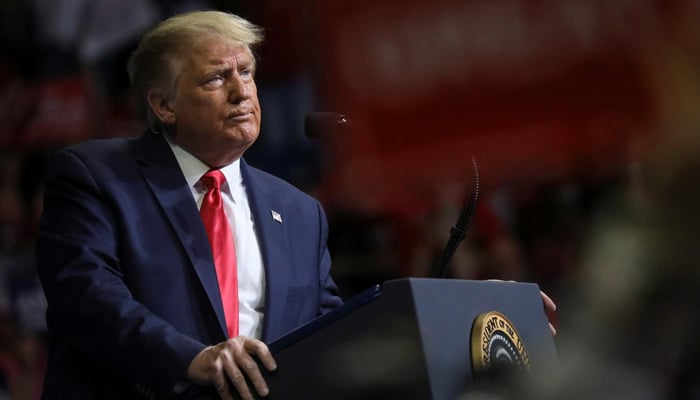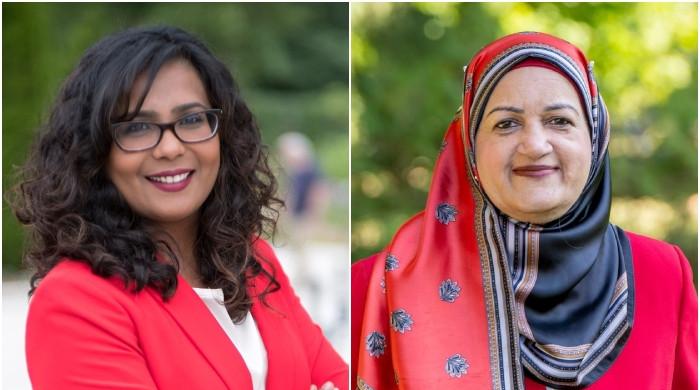Odds against West Bank annexation under Trump’s ‘Deal of Century’
China has already stated that relevant UN resolutions and international consensus constitute basis for settlement of Palestinian issue
June 22, 2020

President Trump will find it hard to carry through his “Deal of the Century” and permit Israelis to annex West Bank and Jordan valley on July 1 due to strong resistance by the European Union (EU), China, and Organisation of Islamic Cooperation (OIC) during the ongoing month.
Before the onset of the coronavirus pandemic and its impact on the global economy and balance of power, India and Israel, two of American strong allies were rushing through with plans to annex and consolidate Kashmir and Palestinian territories in total disregard of the UN resolutions.
Head of EU Foreign Policy, Josep Borrell in his address to the European Parliament on June 19 urged Israel to refrain from the annexation of any occupied Palestinian territory. Borrell affirmed that it would be a “serious violation of international law” if the Israeli government decided unilaterally to annex any part of the West Bank.
OIC Foreign Ministers in a Virtual Summit on June 10 reiterated that any annexation of West Bank and Jordan valley will be a blatant violation of international law, the UN Charter and relevant UN resolutions on the Palestinian conflict. Foreign Minister Shah Mehmood Qureshi urged the international community to resolve Kashmir and Palestine disputes as envisaged by the UN members.
The OIC held an emergency session on Kashmir today, which was briefed extensively by Pakistan foreign minister and was attended by ministers and delegates from Saudi Arabia, Turkey, Azerbaijan and Niger.
The United Secretary-General has also issued separate statements calling for the resolution of these issues in accordance with the UN resolutions. Almost 50 human rights experts working with the UN Human Rights Council recently condemned Israel's plan to annex parts of the occupied West Bank, calling it a " 21st Century apartheid".
China in reaction to President Trump’s Middle East plan has already stated that relevant UN resolutions and the international consensus, such as the two-state solution and the principle of land for peace, constitute the basis for the settlement of the Palestinian issue and should be observed.
The issue also came up for discussion between EU foreign policy chief Josep Borrell and Chinese Foreign Minister Wang Yi on June 9 and will also be under discussion at EU-China Summit on June 22.
In a virtual summit with US Secretary of State Mike Pompeo on June 15, the EU foreign ministers shared their apprehensions about the consequences of the annexation by Israel and its impact on the prospects of a two-state solution and regional stability. Parallels have been drawn by EU member states with the Russian annexation of Crimea if Israel went ahead with annexation on July 1 and that EU reaction will be similar to the Crimean crisis.
Trump is likely to sit down with his aides in the current week to approve or delay the implementation of his Mid-East Plan.
The plan, announced earlier this year, allows Israel to annex over 30% of West Bank and regularise over 200 Israeli settlements where over half a million Jews reside. It also includes annexation of Jordan valley, which is severely resisted by Jordan. Brushing aside hundreds of UN resolutions, it stated that “they (UN Resolutions) have not and will not resolve the conflict”.
The implementation of the controversial plan has gained special importance in the light of very tense and deteriorating relations between China and the US and the interests of both powers in the Middle East and South Asia. Only a couple of days back, US Secretary of State, Mike Pompeo speaking at a virtual conference on “Europe and The China Challenge” accused CCP (communist party of China) of behaving like a “rogue actor” in its neighborhood”.
Pompeo further accused China of border escalation with India, the global spread of Corona, and illegal claim of territory and militarization in the South China Sea.
The recent Chinese military action on the border with India is also an assertion that China will push back any attempt to change the balance of power in the region in unilateral actions on disputed issues.
Chinese interests in South Asia, the Middle East, and Africa are growing in the Belt and Road projects, energy supplies, and other projects. Voices against the treatment of Muslims in India have increased in the Middle East in the last few months while the OIC has taken a firm stance against the unilateral annexation of Kashmir by India last year.
Backing Israel in the annexation of disputed territories on the heels of a similar annexation in Kashmir, by another ally in a region with a large Muslim population, will seriously undermine the American profile in the region. Especially at a time when the US forces are leaving the Middle East and Afghanistan, China is expanding its presence.
It will create further problems for its two main allies, India and Israel, and create further openings for China which is rapidly expanding its interests and partnerships in the region.











